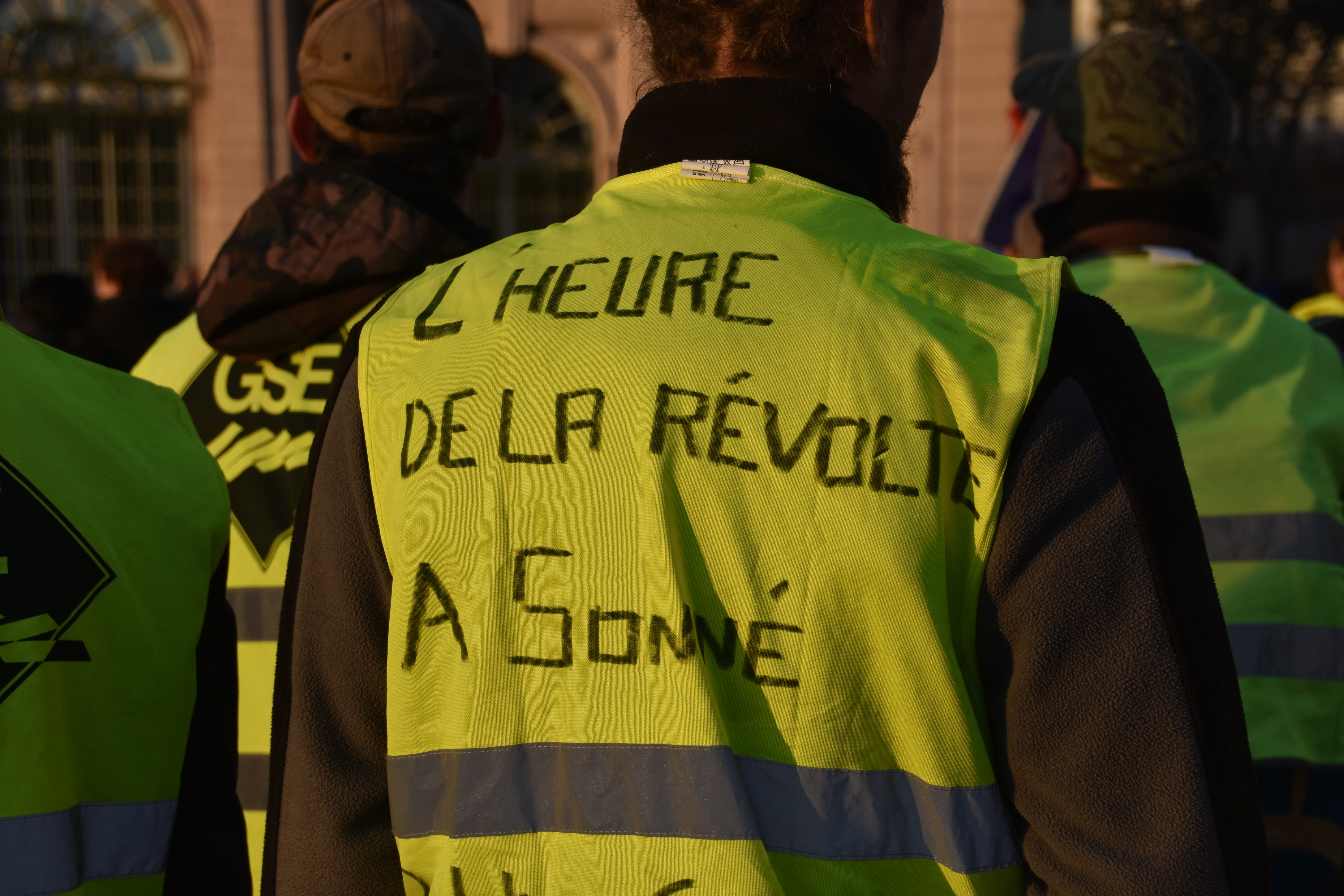Gilets jaunes Act XVII, March 9, 2019

“If we stop, we’ll go back to being anonymous.”[1]
Saturday, March 9. Act XVII of the Gilets jaunes brought out only 28,600 demonstrators throughout the country, with 3,000 of those in Paris. (In comparison, the first Saturday, November 17, saw close to 290,000 in France.) But while the mobilization was the smallest ever, it was also the most diverse in its objectives. A small flash mob gathered at Charles-de-Gaulle-Roissy in protest against the planned privatization of Paris airports. The Gilets roses, or pink vests, representing medical and child care professionals, expressed concern about the closing of clinics throughout the country as well as changes to unemployment insurance that are likely to affect them negatively. Other activists, mostly women, came out to march against domestic violence and sexual assault. There were also protests in cities and towns in the rest of the country. Bordeaux, the site from the earliest days of persistent and determined Saturday protests, often rivaling in numbers those found in Paris itself (and surpassing Paris’s 3,000 this week), was occupied by a determined crowd of 4,000, buoyed by a performance of “On lâche rien/We don’t give up” by Kaddour Hadadi, known as HK.
Priscillia Ludosky is one of the leading voices in the Gilets jaunes; she wrote the Change.org petition, the initial spark for the movement, against the planned carbon tax on gas and diesel. For the March 9 event she had called for a weekend sit-in at the Eiffel Tower, beginning on Friday, in order to “install our rond-points (roundabouts) in the heart of the capital, where we will be visible to all, and heard.”[3] The roundabouts, occupied by small groups from the first days of the demonstrations, rapidly became a symbol of the movement and its close-knit (newly-formed) communities. The planned sit-in attracted very small numbers and was soon dispersed by the police. On Saturday morning Ludosky blocked the Iena Bridge in the company of the climate action groups Alternatiba and ANV-COP21.
Alternatiba means “alternative” in Basque, and is a group devoted to finding earth-friendly ways of living. ANV-COP21 means Action non violente-Conference of Parties 21–with ”Conference of Parties” referring to the nations who signed the Paris climate accords, the 21st such climate conference since the 1992 Rio de Janeiro meeting. Le Figaro described the two groups as “militant ecologists” and as “specialists in often spectacular mobilizations on the climate.”[4] Here they linked their cause with the Gilets jaunes with the chant, “Fin du monde! Fin du mois! C’est pour nous le même combat!/End of the world! End of the month! For us it’s the same fight!” (The “end of the month” is shorthand for living paycheck to paycheck.)
The problem of climate change has always been in the background of the Gilets jaunes movement. The original cause of the uprising, an ill-conceived regressive carbon tax that hit lower incomes much harder than those of the wealthy, was designed to ease, or force, the transition toward electric cars; the French government has set 2040 as the date when gas and diesel cars will be completely phased out. In criticizing the measure, economist Aurore Lalucq noted that the carbon tax mistakenly assumed that driving was “an individual economic act” that one could choose, or choose not, to do.[5] But of course driving depends on the availability of alternate forms of transportation; many people, forced by high rents to live at some distance from their jobs, have no other options available. Lalucq is also a spokesperson for Génération-s, a new political party founded by Benôit Hamon, the 2017 Socialist Party candidate for president, which describes itself as “Left” and “ecological.”[6]
Environmentalist Left or Populist Right? Initially, many observers believed that the movement’s energy would benefit the extreme right Rassemblement national (National Rally, formerly National Front) led by Marine Le Pen. The concern has not gone away; the small turnout this week may simply have allowed the left wing of the movement to become more visible. The next test at the ballot box will be the elections for the European Parliament, May 23-26. Currently the polls have President Emmanuel Macron’s La République en Marche (LREM) and Le Pen’s RN at the top.
But in the meantime there is the Great Debate, and what happens on Saturday, March 16. Macron responded to the Gilets jaunes with a series of face-to-face meetings around the country, organized by local mayors and supplemented by an online space for listing grievances. The Debate began on January 15 and is due to end on March 15; climate marches are scheduled for March 15 (the global demonstration by young people) and March 16, and the Gilets jaunes are hoping for a massive March 16 turnout. Did Act XVII show that the movement is fading, or did it represent merely a “breathing space,” in preparation for next week’s planned massive rally, as the Great Debate comes to an end? Le Monde asked this of one of the diehards near the Champs-Elysées, a 67-year-old who promised “all of France in Paris” to give the government “an ultimatum.”[7]
================================================================
[1.] “Gilets jaunes: coup de mou pour l’acte XVII de la mobilisation,” Libération, 9 March 2019.
https://www.liberation.fr/france/2019/03/09/gilets-jaunes-coup-de-mou-pour-l-acte-xvii-de-la-mobilisation_1714049
[2] Eric Favereau, “Maternité: des fermetures au forceps,” Libération, March 11, 2019, https://www.liberation.fr/france/2019/03/11/maternite-des-fermetures-au-forceps_1714440?xtor=EPR-500001&utm_source=newsletter&utm_medium=email&utm_campaign=quo;
Dan Israel, “Derrière les négociations sur le chômage, la crainte des assistantes maternelles,” Mediapart, February 1, 2019. https://www.mediapart.fr/journal/economie/010219/derriere-les-negociations-sur-le-chomage-la-crainte-des-assistantes-maternelles
[3] “‘Acte XVII’ des ‘gilets jaunes’: plus faible mobilisation depuis le début du mouvement,” Le Figaro March 10, 2019, http://premium.lefigaro.fr/actualite-france/2019/03/09/01016-20190309ARTFIG00064-gilets-jaunes-plusieurs-mobilisations-a-nouveau-prevues-ce-samedi.php
[4] Ibid.
[5] Aurore Lalucq, “La taxe environnementale est devenue la taxe antisociale par nature,” Le Monde, November 9, 2018, https://www.lemonde.fr/idees/article/2018/11/09/la-taxe-environnementale-est-devenue-la-taxe-antisociale-par-nature_5380948_3232.html?xtmc=aurore_lalucq&xtcr=4
[6] See https://www.generation-s.fr, for the website.
[7] “Gilets jaunes: 28,600 manifestants pour l’acte XVII, plus faible mobilisation depuis le début du mouvement,” Le Monde, March 9, 2019.
https://www.lemonde.fr/societe/article/2019/03/09/a-l-approche-de-la-fin-du-grand-debat-les-gilets-jaunes-veulent-un-acte-xvii-decisif_5433579_3224.html